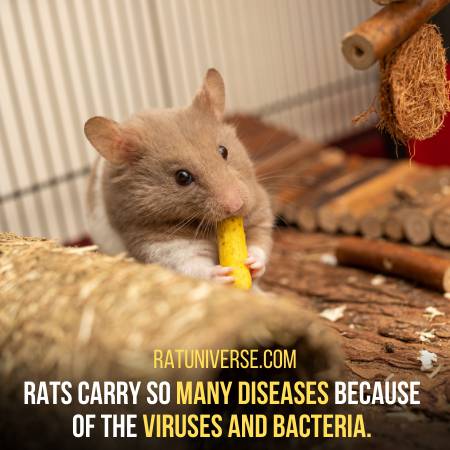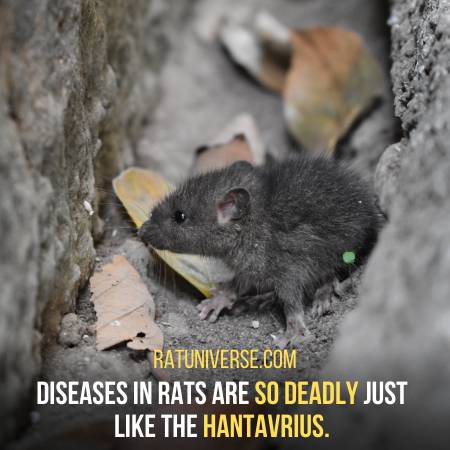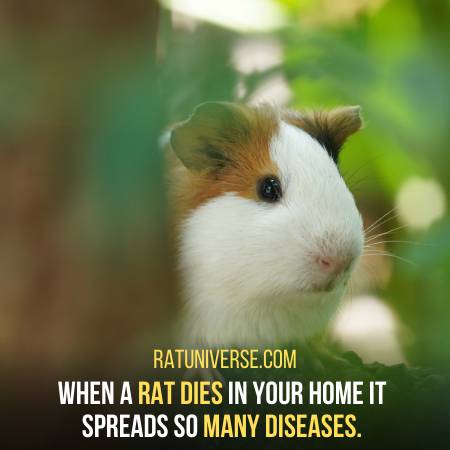Rats are not just for the lab! They carry a lot of diseases that can be transmitted to humans. That’s why you need to know how to get rid of rats in your house and yard. But first, you should learn why rats carry so many diseases in the first place.
Here’s Why Rats Carry So Many Diseases – 10 Reasons
Rats are often carriers of different types of bacteria, parasites, and viruses. These can get transmitted to humans when they come in contact with rat droppings or urine.
1. Rats Carry Bacteria And Viruses
Rats are carriers of bacteria, viruses, and microorganisms that cause diseases to humans.

Rats carry bacteria, viruses, and other microorganisms that cause bartonellosis, trichinosis, and rabies. Rats can carry diseases in their bodies through travel.
2. Rats Carry Fleas That Cause The Bubonic Plague
The bubonic plague is a deadly disease that got transmitted to humans by rats. During outbreaks of the plague in Europe, entire towns got wiped out because they had no way to stop its spread. The fleas from infected rats transmit this deadly disease. Around 20-30% of people exposed to the bacterium responsible for the plague develop a serious, fatal illness.
3. Rat Droppings Contain The Hantavirus
The rat droppings carry the Hantavirus, which gets transmitted through rodent urine.

A person who comes in contact with the virus can get hantavirus pulmonary syndrome (HPS). Symptoms usually develop 1-2 weeks after exposure and begin with flu, including fever and headache.
4. Why Rats Carry So Many Diseases – Rats Are Reservoirs For Leptospirosis
Leptospirosis is a bacterial disease that may lead to liver or kidney damage. It can cause flu-like symptoms in humans and can even be fatal if left untreated. Rats are the reservoir for Leptospirosis, it gets spread through urine that contaminates water or soil.
5. Rabies Gets Transmitted Through Rat Bites
Rabies is transmitted through bites from an infected animal, such as a rat. When we think about why rats carry so many diseases, we shouldn’t forget their deadly bites.
Rats are also carriers of rabies which they transmit when they bite or scratch you. A person who comes in contact with the saliva will typically develop rabies within a week.
6. Rat’s Saliva Can Spread Infections
Infection can also happen if you have broken skin that comes into contact with rat urine, droppings, saliva, and other rodent contaminants.

This happens most often while cleaning rodent-infested areas. In some cases, there is no obvious bite or scratch to indicate the person is infected.
7. Why Rats Carry So Many Diseases – Rat-Bite Can Lead To Fever In Children
Children under five years old are less immunized, there are chances to get affected by rate-bite fever.
Rat-bite fever can occur when a rat’s tooth pierces the skin while biting or chewing on an infected person. Symptoms usually appear within 7–14 days after exposure. They include chills, headache, muscle pain, vomiting, bleeding under the skin, causing purple spots, which turn into a rash, and a high fever. Prompt treatment with antibiotics can prevent serious complications like meningitis.
8. People At Greater Risk For Rat-Bite Fever
People living near farms and storage areas are at risk of rat-bite fever, people who work outdoors, etc.
About 80% of rat-bite fever cases occur after the victim has been handling live or dead rodents. Also, by eating food contaminated by rats, sharing an environment with an infected rodent, or being bitten by a rodent.
9. Why Rats Carry So Many Diseases – A Rat Dies In Your Home
Rats that die in a home or any enclosed space will release harmful toxins into the environment. When a rat dies in your home, it releases harmful germs into the air, making you sick if you breathe them in.

These pathogens stay alive and can cause infection for up to two weeks after the rat has died. The risk increases if the dead rat is in an enclosed space, like a wall or attic, because of limited airflow and bacteria, can build up.
10. Rats Live In Groups That Spreads Diseases
Rats live in groups. It makes it easier for these diseases to pass from rodent to rodent. It can pass from rodent feces to humans through skin contact, airborne transmission, or ingestion of food contaminated with rat feces.
How To Avoid Rat Diseases – 6 Simple Tips
Now don’t worry! I’m going to tell you how to avoid these diseases, so read on!
1. Keep Your Home Clean And Tidy
Rats are attracted to areas that are dirty and messy. To avoid rats, make sure your home is clean and tidy. Clean your home properly and regularly. You should also avoid touching or handling the rats, dead or alive.

Wash your dishes, clean the counters, empty and wipe out your trash cans. Also, don’t forget to vacuum your carpets and sweep the floors, etc.
2. Seal Up Cracks 0r Holes That Lead To Your Home
Rats can get through small areas where they enter your house.
Seal up any cracks or holes so that rats cannot get in.
You can use steel wool, galvanized metal mesh, caulk, or fine wire to seal off the entry points of your home. You can also make a DIY solution with talcum powder and peppermint oil to deter rodents.
3. Store Food In Airtight Containers
Rats can get to your food if you store them in open or weakly sealed containers.

Make sure you put away your food and do not leave it out on the side like this! It is also a good idea to keep food items in an airtight container.
4. Remove Pet Food From The Floor After Feeding Them
Rats are attracted to pet food. They can get to your pets’ food and eat it. To avoid this, put away your pet’s food after feeding them. Also, do not place any food on the floor if you have a rat problem, as they will be able to get to it.
5. Put Away Garbage Cans
Rats can get through small areas where they enter your house. Make sure to put away your garbage cans so these are inaccessible to rats.
Do not put the garbage in open bags or containers – this will attract rats. Make sure you put the trash away in a container that is difficult for them to access.
6. Use Rat Poison Around Your House
If you have a large infestation, and the steps above did not work for you, it would be best to use rat poison. Be careful when using rat poison as it can kill other animals or pets as well.

Do not use poison in areas where your pets or children can reach it as they might eat it!
Also, you should wear rubber gloves when handling the poison.
Conclusion
Rats carry more than 40 diseases, many of which are contagious to humans. It’s a problem for anyone who lives in close quarters with rats or has an infestation on their property.
Now you must be aware of the reasons why rats carry so many diseases. So avoid these diseases by keeping your home safe, sealing the holes, storing food, putting away garbage, etc.
If your home is currently experiencing rat infestation issues, consult a professional exterminator. Please do let us know what your thoughts on it are?

Leave a Reply